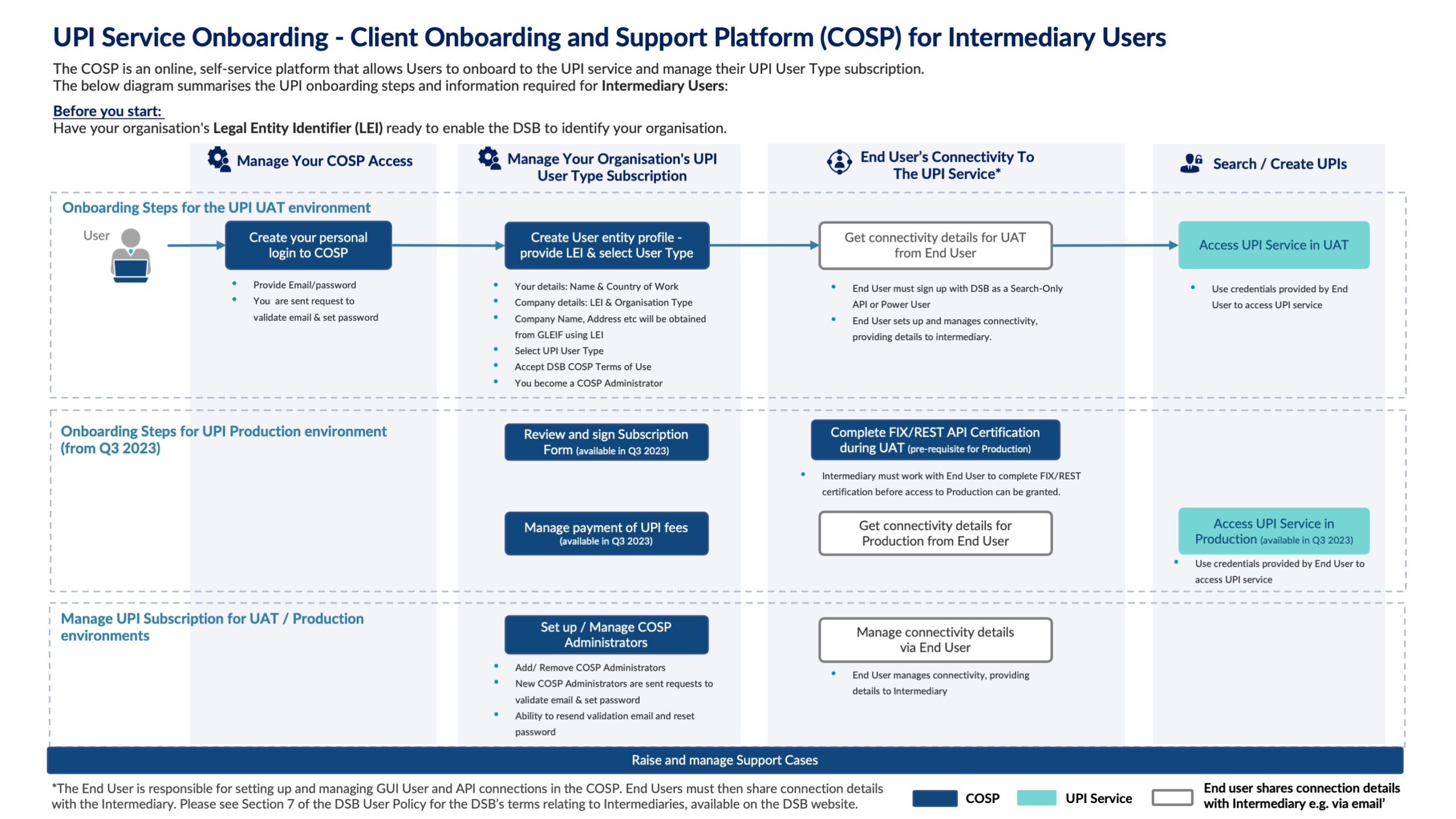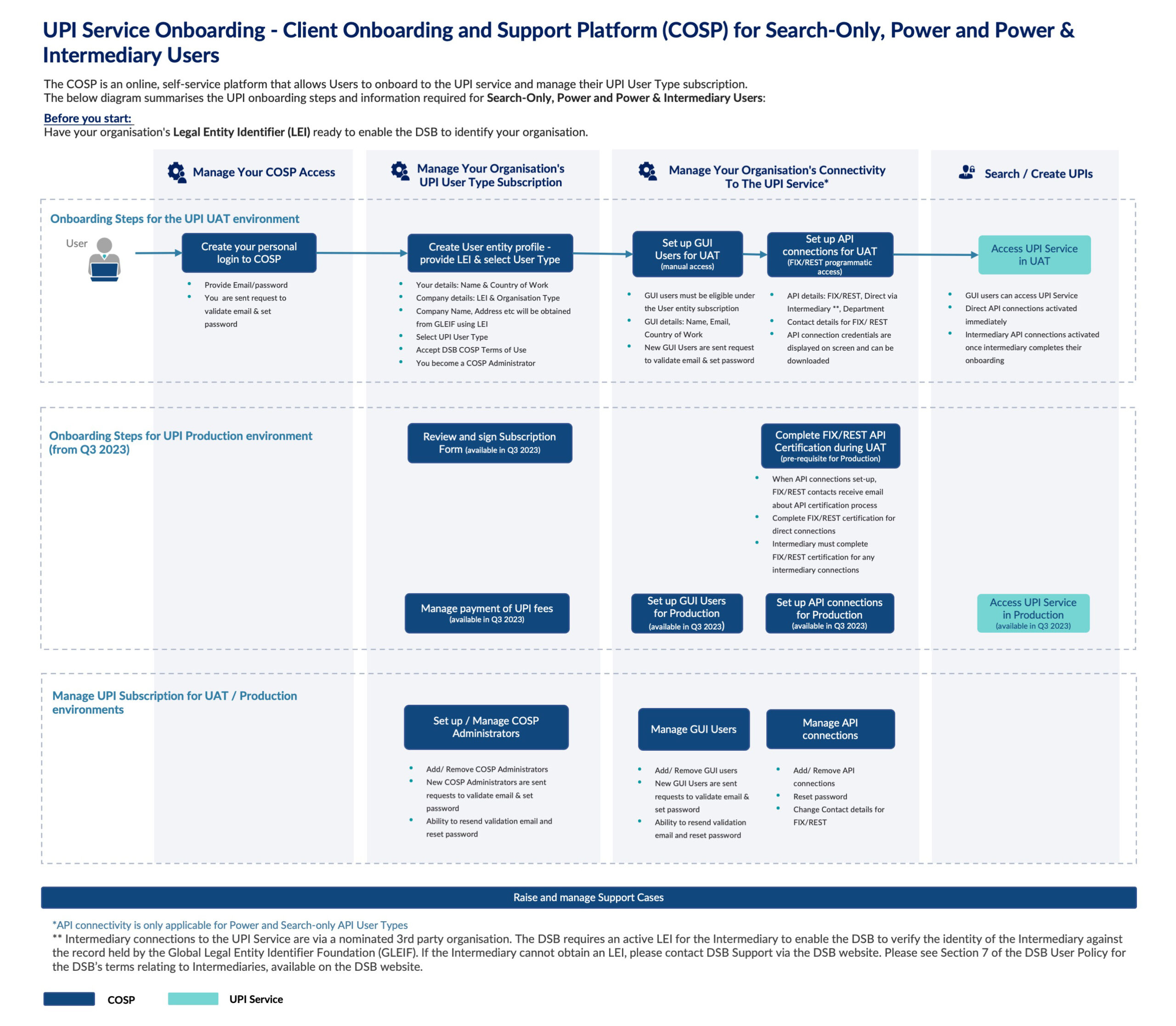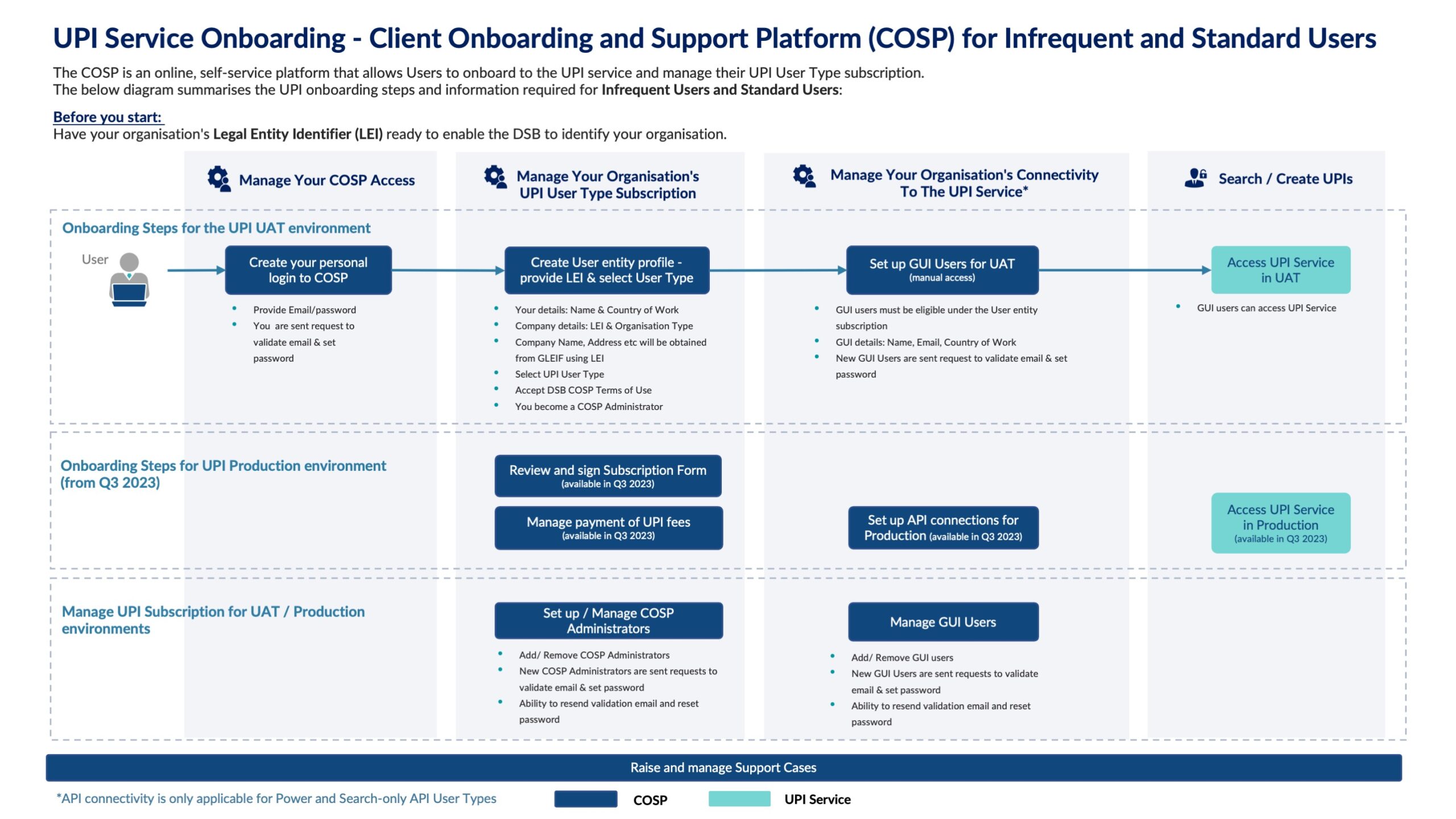In order to ensure that UPI/ISIN for IR Fixed – Floating Swaps are generated in a consistent way, DSB users are advised to follow the guidance provided below.
- Rates.Swap.Fixed_Float_Zero_Coupon will only be used for the product type of IRS (fixed floating swaps) when the fixed leg has a fixed amount specified. Otherwise, the Rate.Swap.Fixed_Float template will be used.
- Rates.Swap.Inflation_Fixed_Float_Zero_Coupon will be used for the product type of ZC Inflation Swap where additional bond details are not specified.
- Rates.Swap.Inflation_Fixed_Float_YoY will be used for the product type of ZC Inflation Swap where the additional bond details have been specified.
The Cross-Currency Fixed-Float NDS template does not currently support the Settlement Currency. It is advised that the users should use the alternate template Rates Swap Cross-Currency Fixed-Float and set CASH as the Delivery Type to satisfy this requirement.
As a result, the Cross-Currency Fixed-Float NDS Request Template will be decommissioned.
Question: Are the OIS-specific Rates templates still required and, if so, what guidance should be provided for their use?
Answer: In order to address possible duplication of Interest Rate Swap identifiers, users are advised to avoid the generation of OTC ISIN and UPIs using the Fixed-Float OIS and Basis OIS templates. Users are instead advised to use an appropriate template that is not OIS-specific.
Question: Are there any circumstances under which an IRS could have a negative Reference Rate Term?
Answer: In order to conform to accepted market practice, users are advised to enter only positive values in the Reference Rate Term Value attribute for Interest Rate Swaps.
Question: When generating or retrieving an OTC ISIN or UPI for an Index or Index Tranche CDS, what value should be used for the Underlying Index Term Unit and Value attributes?
Answer: When generating or retrieving an OTC ISIN or UPI for an Index or Index Tranche CDS, the quoted contract tenor should be entered as the Underlying Index Term Value and Unit.
For example: if the underlying Index is the ITraxx Europe Crossover 5 YEAR contract, then the Underlying Index Term Value and Unit should be set to 5 YEAR.
Where there are examples of products that include components from multiple issuer types, users are advised to set Underlying Issuer Type to “Corporate” in all cases where at least one entity within the index can be categorized in this way. Where no constituent entity can be classified as Corporate, the user is advised to enter a value of “Local” for this data element.
| Asset Class |
Instrument Type |
Product |
| Credit |
Swap |
Index |
| Credit |
Swap |
Index_Tranche |
| Credit |
Swap |
Total_Return_Swap |
| Credit |
Swap |
Non_Standard |
The DSB has sourced the list of Floating Rate Indices from FpML, specifically the following schema:
https://www.fpml.org/spec/coding-scheme/fpml-schemes.html
The DSB is aligned with the FpML change process and cannot independently amend or add to the dataset. The DSB will work with industry and the index provider in the pursuit of enhancing the source enumerations in a timely fashion such that all required indices are represented.
The addition of new indices to the JSON schemas maintained by the DSB are subject to the Change and Challenge process policy to be published by the DSB.
| Asset Class |
Instrument Type |
Product |
| Rates |
Forward |
FRA_Index |
| Rates |
Option |
CapFloor* |
| Rates |
Option |
Inflation_CapFloor* |
| Rates |
Option |
Non_Standard |
| Rates |
Swap |
Basis** |
| Rates |
Swap |
Basis_OIS** |
| Rates |
Swap |
Cross_Currency_Basis** |
| Rates |
Swap |
Cross_Currency_Fixed_Float |
| Rates |
Swap |
Cross_Currency_Fixed_Float_NDS |
| Rates |
Swap |
Cross_Currency_Inflation_Swap |
| Rates |
Swap |
Cross_Currency_Zero_Coupon |
| Rates |
Swap |
Fixed_Float |
| Rates |
Swap |
Fixed_Float_OIS |
| Rates |
Swap |
Fixed_Float_Zero_Coupon |
| Rates |
Swap |
Inflation_Basis** |
| Rates |
Swap |
Inflation_Basis_YoY** |
| Rates |
Swap |
Inflation_Basis_Zero_Coupon** |
| Rates |
Swap |
Inflation_Fixed_Float_YoY |
| Rates |
Swap |
Inflation_Fixed_Float_Zero_Coupon |
| Rates |
Swap |
Inflation_Swap |
| Rates |
Swap |
Non_Standard** |
| Other |
Forward |
Non_Standard |
| Other |
Option |
Non_Standard** |
| Other |
Other |
Non_Standard** |
| Other |
Swap |
Non_Standard** |
*Where attribute name is ISO Underlying Instrument Index.
**This applies to ISO Reference Rate & Other Leg Reference Rate.
Contract Specification enumerated values are based on the FpML Matrix Term Scheme and are filtered to support the appropriate entries for the selected Single Name CDS products. For example, Credit.Swap.Corporate will allow only Corporate Contract Specifications.
| Attribute |
Single Name CDS Product |
Example Value |
| Contract Specification |
Credit.Swap.Corporate |
NorthAmericanCorporate |
| StandardNorthAmericanCorporate |
| StandardNorthAmericanFinancialCorporate |
| Credit.Swap.Sovereign |
WesternEuropeanSovereign |
| StandardWesternEuropeanSovereign |
| Credit.Swap.Municipal |
USMunicipalRevenue |
| StandardUSMunicipalRevenue |
For CDS Non_Standard, the supported enumerated value for Contract Specification is dependent on the Underlying Issuer Type selected, (i.e., Corporate, Local or Sovereign).
The selection of the Underlying Issuer Type will determine the valid input values for the Contract Specification attribute in the following way:
| Attribute |
Single Name CDS Product |
Underlying Issuer Type |
Example Value |
| Contract Specification |
Credit.Swap.Non_Standard |
Corporate |
NorthAmericanCorporate |
| StandardNorthAmericanCorporate |
| StandardNorthAmericanFinancialCorporate |
| Sovereign |
WesternEuropeanSovereign |
| StandardWesternEuropeanSovereign |
| Local |
USMunicipalRevenue |
| StandardUSMunicipalRevenue |
Contract Specification is only supported in the specifications of the following Single Name CDS products and is not supported for CDS products, i.e., Index, Index_Tranche, Loan, ABS, Total_Return_Swap.
| Asset Class |
Instrument Type |
Product |
| Credit |
Swap |
Corporate |
| Credit |
Swap |
Sovereign |
| Credit |
Swap |
Municipal |
| Credit |
Swap |
Non_Standard |
Users are advised to define the underlying asset for these products by entering an LEI. If the Legal Entity in question has not been assigned an LEI, the underlier’s ISIN should be employed. In the event of there being no assigned LEI and in the absence of a defined underlying security (e.g.: SRO trades and No Ref Ob trades), the user is advised to enter an LEI of “OTHER”.
| Asset Class |
Instrument Type |
Product |
| Credit |
Option |
Non_Standard |
| Credit |
Swap |
ABS |
| Credit |
Swap |
Corporate |
| Credit |
Swap |
Loan |
| Credit |
Swap |
Municipal |
| Credit |
Swap |
Sovereign |
| Credit |
Swap |
Total_Return_Swap |
| Credit |
Swap |
Non_Standard |
| Other |
Option |
Non_Standard |
| Other |
Other |
Non_Standard |
| Other |
Swap |
Non_Standard |
In order to ensure consistency when creating or retrieving ISINs for Credit Derivatives where the underlying index does not have a Series, Version or Term (such as the iBoxx family of Total Return Indices), the request to the DSB should apply the following standard input values:
- Underlying Credit Index Series: 1 (one)
- Underlying Credit Index Version: 1 (one)
Note: A standard value for the Underlying Instrument Index Term Unit / Value has not yet been agreed.
This advice applies to the following Credit templates:
| Asset Class |
Instrument Type |
Product |
| Credit |
Swap |
Index_Tranche |
| Credit |
Swap |
Index |
| Credit |
Swap |
Total_Return_Swap |
| Credit |
Swap |
Non_Standard |
| Other |
Swap |
Non_Standard* |
| Other |
Other |
Non_Standard* |
*Where a Credit Index is included.
To ensure the UPI and OTC ISIN can be created, validated, and returned to users near real time, the only validation the DSB performs on the underlying ISIN is syntactic validation. The onus is on the user to ensure the correct underlier is submitted for the correct template.
You should note that not all DSB UPI/ISIN that are created are being used for regulator purposes, user have been creating DSB UPI/ISIN for internal use.
For full list of validations please refer to our DSB Product Definition documentation.
| Asset Class |
Instrument Type |
Product |
| Credit |
Forward |
Non_Standard |
| Credit |
Option |
Non_Standard |
| Credit |
Swap |
ABS |
| Credit |
Swap |
Corporate |
| Credit |
Swap |
Loan |
| Credit |
Swap |
Municipal |
| Credit |
Swap |
Sovereign |
| Credit |
Swap |
Total_Return_Swap |
| Credit |
Swap |
Non_Standard |
| Equity |
Swap |
Price_Return_Basic_Performance_Single_Name |
| Equity |
Swap |
Parameter_Return_Dividend_Single_Name |
| Equity |
Swap |
Parameter_Return_Variance_Single_Name |
| Equity |
Swap |
Parameter_Return_Volatility_Single_Name |
| Equity |
Swap |
Price_Return_Basic_Performance_Single_Name_CFD |
| Equity |
Swap |
Portfolio_Swap_Single_Name |
| Equity |
Swap |
Portfolio_Swap_Other |
| Equity |
Swap |
Non_Standard |
| Equity |
Forward |
Price_Return_Basic_Performance_Single_Name |
| Equity |
Forward |
Price_Return_Basic_Performance_Single_Name_CFD |
| Equity |
Forward |
Non_Standard |
| Equity |
Option |
Single_Name |
| Equity |
Option |
Non_Standard |
| Rates |
Option |
Debt_Option |
| Rates |
Forward |
Debt |
| Rates |
Forward |
FRA_Other |
| Other |
Forward |
Non_Standard |
| Other |
Option |
Non_Standard |
| Other |
Other |
Non_Standard |
| Other |
Swap |
Non_Standard |
The DSB provides support for the following templates for Commodity Multi-Exotic instruments:
| Asset Class |
Instrument Type |
Product |
| Commodities |
Swap |
Multi_Exotic_Swap |
| Commodities |
Option |
Multi_Exotic_Option |
| Commodities |
Forward |
Multi_Exotic_Forward |
These templates are intended to be used where the product has one or more of the following characteristics:
a. The product cannot be classified under a single asset-specific base product and so it qualifies as a Multi-Exotic Commodity (MCEX).
b. The product is based on multiple underlying assets (Prop Index, Listed Index and/or Reference Rate).
Please note that the CFI Code (3rd Letter / Underlying Asset) can vary depending upon the values input by the ISIN requestor and the selected instrument type (Swap, Option, Forward).
As agreed by members of the DSB Commodities Taskforce, Commodity Multi-Exotic Templates should be used where an underlying index or reference rate spans multiple commodity types (as defined by the CFI standard). Similarly, Commodity Single Index Templates should be used when the underlying reference rate and/or Index is based on a single commodity type.
| Asset Class |
Instrument Type |
Product |
| Commodities |
Swap |
Single_Index |
| Commodities |
Option |
Single_Index |
| Commodities |
Forward |
Single_Index |
These templates are intended to be used when the product has the following characteristics:
a. The product can be classified under one asset-specific Base Product (e.g.: Energy, Agriculture, Freight, Other, etc.) using the values defined in ISO 20022.
b. The product is based on a single underlying Index – either an Instrument Index or Proprietary Index.
It should be noted that a Base Product of MCEX (Multi-Exotic Commodity) will not be supported for the above products.
The CFI Code for the resultant Commodity Single Index record will always have the Underlying Asset (character 3) set to “I” (Index):
a. Single_Index Swap: STI*X*
b. Single_Index Option: HTI***
c. Single_Index Forward: JTIX**
The DSB has adopted the ISO Currency Code list (ISO 4217) for all currency attributes. To accommodate offshore currencies, the DSB has introduced Place of Settlement (ISO 3166) as an additional attribute in the FX Non-Standard Product Definitions. This allows an offshore location to be input against an onshore currency for example to recognize CNH, the user should input CNY into Settlement Currency and Hong Kong into Place of Settlement.
| Asset Class |
Instrument Type |
Product |
| Foreign_Exchange |
Swap |
Non_Deliverable_FX_Swap |
FX Swaps that are based on non-deliverable or offshore variations of non-deliverable currencies are supported through the Non-Deliverable Swap template. The template supports the input of the ISINs of two matching non-deliverable or non-standard FX forwards that have identical currency pairs and differing expiry dates.
Non-Deliverable Swap ISINs for Offshore variations of non-deliverable currencies (such as the Chinese Yuan/Renminbi) can be generated using a pair of underlying non-standard FX forwards. In this case, the underlying ISINs should include the ISO 4217 currency code (e.g.: CNY) and an appropriate ISO 3166 Place of Settlement (e.g.: Hong Kong).
| Asset Class |
Instrument Type |
Product |
| Foreign_Exchange |
Swap |
Non_Deliverable_FX_Swap |
Question: Each leg of a SWAP can independently have different notional schedules. What should a user do such scenarios?
- If both legs are Constant -> select Constant.
- If both legs are Accreting -> select Accreting.
- If both legs are Amortizing -> select Amortizing.
- Otherwise -> select Custom.
In order to ensure that UPI/ISIN for IR Basis Swaps (i.e.: Float vs Float) are generated in a consistent way, DSB users are advised to follow the guidance provided below.
For Interest Rates Swaps based on a pair of underlying floating reference rates:
- If the two legs have different Notional Currencies: use the Cross-Currency Basis template.
- Else: If both legs are standard floating Reference Rates: use Basis template.
- Else: If any leg is an OIS Rate: use the Basis OIS template.
The DSB is aware of the increased use of cross-currency Basis OIS and the PC will continue to monitor the situation and will follow up as required.
The DSB supports the creation of ISINs for several types of FX Forwards*:
Where both currencies are deliverable.
- Non-Deliverable Forward (NDF):
Where one or both currencies are non-deliverable (in the context of the trade) and require a Settlement Currency.
Where the FX Forward does not adhere to the standard instrument structure OR
Where the FX Forward is based on an Offshore variation of a non-deliverable currency (such as the Chinese Yuan/Renminbi). In this situation the Offshore variation of the currency requires a Place of Settlement to provide a complete definition since the currency is not included in the ISO 4217 currency list.
*In addition to the above, the DSB also supports a number of specialised FX Forward products: Vol Var, Contract for Difference, Rolling Spot, Spreadbet and these fall outside the scope of this note.
| Asset Class |
Instrument Type |
Product |
| Foreign_Exchange |
Forward |
Forward |
| Foreign_Exchange |
Forward |
NDF |
| Foreign_Exchange |
Forward |
Non_Standard |
Users submitting a value for Settlement Currency in any FX UPI / ISIN product template are advised that the attribute should not contain XXX without prior authorization of the DSB Product Committee.
Users are requested not to submit a value of XXX which is defined in the ISO 4217 standard as “No currency involved in the transaction” and thus is not seen as appropriate for use in FX instruments.
The Product Committee requests that users wishing to submit XXX as an input value should provide a business case to secretariat@anna-dsb.com with supporting information.
| Asset Class |
Instrument Type |
Product |
| Foreign_Exchange |
Option |
Barrier_Option |
| Foreign_Exchange |
Option |
Digital_Option |
| Foreign_Exchange |
Option |
NDO |
| Foreign_Exchange |
Option |
Non_Standard |
| Foreign_Exchange |
Forward |
NDF |
| Foreign_Exchange |
Forward |
Non_Standard |
| Foreign_Exchange |
Forward |
Spreadbet |
| Foreign_Exchange |
Forward |
Vol_Var |
Question: When new UPI templates are introduced, that industry believes may not also require an OTC ISIN (e.g. where the instrument may not be in the scope of MiFID II but still be reportable to a TR in a G20 jurisdiction) will it be possible that not all UPI templates will have an equivalent OTC ISIN template? Would this mean that a user may not be able to use the existing ISIN service to search/generate UPI for such instruments due to the unavailability of corresponding ISIN templates?
No, such a scenario will not be possible. Each UPI template will have a corresponding OTC ISIN, and therefore a corresponding OTC ISIN template.
Question: Can a user request to have ISIN templates on every product/instrument irrespective of the jurisdictional reportability, so that existing ISIN service can be used for fetching UPI code/record?
Per the above, where DSB can maintain the hierarchy (and we expect to always be able to) there will be templates published for all products the DSB supports.










